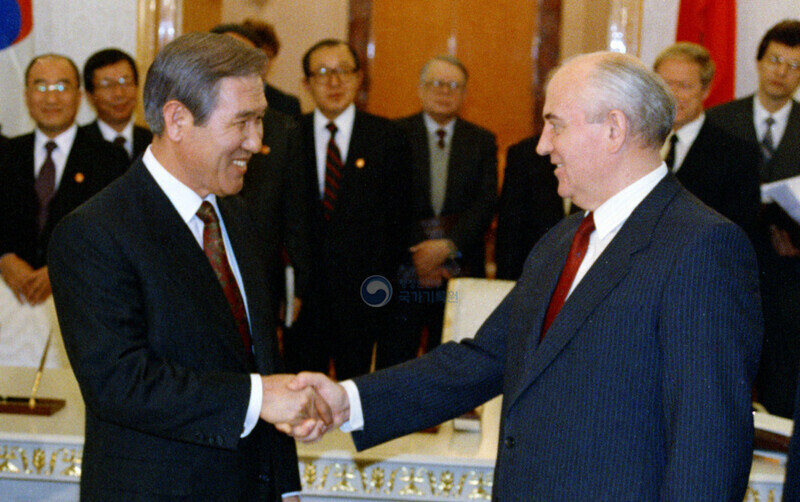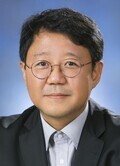hankyoreh
Links to other country sites 다른 나라 사이트 링크
[Column] My hope for Korea’s incoming conservative administration


The opposition party was elected to the South Korean presidency this year for a third time since the first peaceful transfer of power between administrations in 1997, with the two previous times coming in 2007 and 2017.
Since the administration is passing from progressive hands into conservative ones, full-scale changes are being predicted in key positions, along with major shifts in the areas of political, economic, and social policy. The area drawing the most attention of all is that of foreign policy.
For millennia, Korea’s history has been one of having to perform a delicate tightrope walk due to its geopolitical position.
The kingdom of Goguryeo fell under pressure from the Tang dynasty, with the Andong Duhufu (Protectorate-General to Pacify the East) moving in to take its place. Pressure from the Yuan dynasty was also a key factor in the fall of Goryeo and its replacement by Joseon. Justifications concerning the Ming dynasty are what led to the “humiliation of Samjeondo.”
The problems only deepened as the world became more interlinked through scientific and technological developments. Faced with its own crisis, the Qing dynasty broke with its practice of maintaining a peaceful tributary relationship and sent Yuan Shikai to set up a command in Yongsan for the colonization of Joseon.
Japan, which was suffering under unequal treaty terms, colonized Joseon and set up a military command and governor’s palace in Yongsan.
Faced with this crisis, the Joseon government splintered into pro-Japanese, pro-Qing, and pro-Russian factions. They failed to respond effectively, and, eventually, the empress was assassinated and the emperor fled to take refuge at a foreign legation.
Unable to rely on any country, Joseon sought to draw upon the strength of the US — a country that didn’t have the slightest interest in it. It was at this time that the US reached a secret agreement with Japan to exchange Joseon for the Philippines.
If anything, the Cold War that emerged after 1945 reduced South Korea’s diplomatic considerations. Now it no longer had to take China or Russia into account.
But those pre-19th century concerns returned when China implemented reforms and openness and the communist world collapsed. Those concerns now seem to have reached an all-time high.
Indeed, there is one new concern now that Korea didn’t have in the past: the North Korean nuclear issue.
At this point, it would be quite meaningful to look back on the cases where conservative administrations have succeeded in the past with their foreign policy.
The arrival of the Roh Tae-woo administration in 1988, and the attendant security situation, seemed at the time to be rolling back the tide of democratization. But Roh’s Nordpolitik was actually a major achievement that transformed Korea’s history.
The Roh administration’s declaration of July 7, 1988, and North Korea policy were quite forward-thinking, to the point where Kim Dae-jung would mention the Inter-Korean Basic Agreement of 1991 in his inaugural address. There was also a nuclear non-proliferation declaration, while South Korea established diplomatic relations with the Soviet Union and China amid the global shift away from the Cold War framework.
Indeed, it could be argued that this sort of future-oriented foreign policy is what laid the groundwork for the economic growth that followed in the 2000s. The administration read the trends of the times.
A similar example can be found in the US. Richard Nixon is one of the most heavily criticized presidents in US history — but it was Nixon who opened the door with China.
His actions could be seen as a last-ditch strategy that the US was obliged to adopt with the situation that the Vietnam War had forced it into. But detente and Nixon’s visit would go on to alter the futures of China and the Soviet Union and hasten Germany’s reunification, paving the way for the US’ eventual Cold War victory.
Would the US public have simply accepted the president opening the door with China if it had been a Democrat like John F. Kennedy or Lyndon Johnson?
Johnson was progressive with his domestic policies; when asked why he had suddenly intervened in Vietnam, he answered that if he hadn’t, there would have been a second round of “McCarthyism.” It was because Nixon was considered so conservative among US politicians at the time that he was able to shake hands with Mao Zedong.
Along the same lines, we can ask what would have been the outcome if it had been Kim Young-sam or Kim Dae-jung who came out first with the July 7 declaration. It was thanks to Roh’s Nordpolitik that Kim Young-sam was able to broach the topic of an inter-Korean summit in his inaugural address, while Kim Dae-jung was able to declare that he would not pursue “unification through absorption” of North Korea.
The current situation could be seen as an even bigger crisis than the one that happened amid the post-Cold War transition.
The conflict between the US and China continues. The alliance with the US is the most central axis of South Korea’s security, while China is its biggest trade partner.
Amid a failure to make any further progress in dialogue with the US, North Korea has continued to test-launch missiles. There’s also a possibility that its nuclear weapons are becoming more advanced. Time is not on our side.
Not only that, but the war in Ukraine is posing a threat not only to the global economy in general but also to South Korea’s economy in particular. Skyrocketing oil prices are endangering not just trade but individual livelihoods.
As it takes office amid this crisis, I hope that the new conservative administration makes wise decisions.
The progressive-leaning Kim Dae-jung administration opened up new horizons for relations with Japan through his joint declaration with then-Japanese Prime Minister Keizo Obuchi in 1998; the history-altering choices made by the Roh Tae-woo and Nixon administrations would not have been possible had they not been conservatives.
Here’s hoping the incoming conservative administration realizes the kind of historic achievements that are only possible under a conservative administration.
Please direct questions or comments to [english@hani.co.kr]

Editorial・opinion
![[Column] Welcome to the president’s pity party [Column] Welcome to the president’s pity party](https://flexible.img.hani.co.kr/flexible/normal/500/300/imgdb/original/2024/0515/3917157400447943.jpg) [Column] Welcome to the president’s pity party
[Column] Welcome to the president’s pity party![[Editorial] Korea must respond firmly to Japan’s attempt to usurp Line [Editorial] Korea must respond firmly to Japan’s attempt to usurp Line](https://flexible.img.hani.co.kr/flexible/normal/500/300/imgdb/original/2024/0514/2317156736305813.jpg) [Editorial] Korea must respond firmly to Japan’s attempt to usurp Line
[Editorial] Korea must respond firmly to Japan’s attempt to usurp Line- [Editorial] Transfers of prosecutors investigating Korea’s first lady send chilling message
- [Column] Will Seoul’s ties with Moscow really recover on their own?
- [Column] Samsung’s ‘lost decade’ and Lee Jae-yong’s mismatched chopsticks
- [Correspondent’s column] The real reason the US is worried about Chinese ‘overcapacity’
- [Editorial] Yoon’s gesture at communication only highlights his reluctance to change
- [Editorial] Perilous stakes of Trump’s rhetoric around US troop pullout from Korea
- [Guest essay] Preventing Korean Peninsula from becoming front line of new cold war
- [Column] The state is back — but is it in business?
Most viewed articles
- 1[Column] Welcome to the president’s pity party
- 2[Editorial] Korea must respond firmly to Japan’s attempt to usurp Line
- 3Korea cedes No. 1 spot in overall shipbuilding competitiveness to China
- 4Could Korea’s Naver lose control of Line to Japan?
- 5[Editorial] Transfers of prosecutors investigating Korea’s first lady send chilling message
- 6[Column] Will Seoul’s ties with Moscow really recover on their own?
- 7US has always pulled troops from Korea unilaterally — is Yoon prepared for it to happen again?
- 8Second suspect nabbed for gruesome murder of Korean in Thailand, 1 remains at large
- 9Korean auto industry on edge after US hints at ban on Chinese tech in connected cars
- 10Major personnel shuffle reassigns prosecutors leading investigations into Korea’s first lady